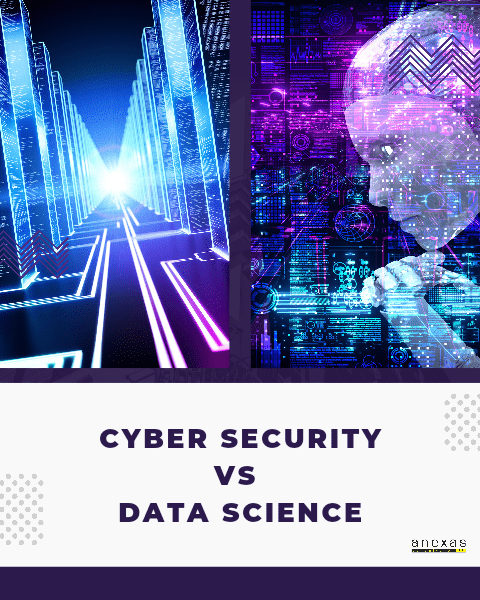Cyber security vs Data Science
Data Science isn’t restricted to one job as it involves multiple disciplines such as extracting data, collecting it, building data models, performing analysis, and finally communicating the findings for business solutions. Cyber Security focuses completely on data security. It guards data systems and networks from unauthorized access, breaches, and cyber-attacks. It requires continuous data monitoring, scanning, detecting risks, and updating the system for protection. There is a lot of discussion about which is a better career choice in Cyber Security vs. Data Science, but the two jobs are very different in discipline and responsibility. It is important to understand the two fields thoroughly to make a decision.
In this article, we will discuss the basic concepts of Cyber Security and Data Science while explaining the objectives, importance, skill sets, career paths, job roles and responsibilities, job positions, and educational requirements in the two fields.

Difference between Data Science and Cyber Security
The main difference between Cyber Security and Data Science is that Data Science works on the data while Cyber security protects the data. Data Science manipulates big data with scientific approaches to use in business. Cyber Security safeguards the big data pools in a business from threats.
What is Data Science?
In an organization, Data Science is responsible for working on big data sources to get insights for decision-making. It requires knowledge of the organization, programming skills, scientific methods, tools, and techniques to get the end results. Data Science professionals must possess fluency in machine learning and deep learning. One of the uses of Data Science can be understood by the example of corporations where Data Science extracts current and future trends to help businesses make informed decisions.
How does Data Science work?
Data Science has a lifecycle of 5 stages, which are
- Acquiring data- Collection of structured and unstructured data in different forms and patterns, understanding the obtained data, database management, and storage.
- Cleaning the data- Cleaning and processing data for readability and error-free analysis.
- Analyzing data- Data visualization to find patterns and trends and to build hypotheses.
- Modeling the data- Writing algorithms for predictive solutions on the data resulting in error-free insights.
- Communicating the data- Using different visualizations or presentation skills to present the findings.
Career in data science
As the data available is increasing, so does the demand for Data Science professionals. All major businesses and organizations use data science to increase customer satisfaction, product quality, service improvement, and business expansion. To begin with, you can start with a data science graduation or diploma. But even if you have graduated in any other field, there are many data science certification courses available that can help you learn all the industry-based skills and tools to start your career.
Anexas Data Science Course is conducted in three levels basic, intermediate, and advanced. The course contents include the basics of data science, all programming tools, and concepts like modeling analyzing, and visualizing data. After completion, you are certified by Anexas Europe Certification. You may choose any one of the three courses based on your requirement or you may enroll in all three together.
Data Science – Basic Course
Data Science – Intermediate Course
Data Science – Advanced Course
Importance of Data Science
Data Science has changed the decision-making process of businesses completely by allowing them to take decisions based on facts and analysis rather than on prediction. A few ways in which Data Science is important to domains
- Informed Decision making- Data-driven decisions help domains to reduce risks in planning and decision making.
- Trends and Patterns- Data Science professionals study trends and patterns from data that domains use in deciding the correct actions to be taken.
- Customer behavior- Data Science studies consumer habits based on customer data and search-related data, which helps domains to reach more customers.
- Areas of improvement- Based on the findings and performances, domains improve their products, service, and customer interactions.
What is Cyber Security?
True to its meaning, Cyber Security is the security of electronics, networks, and data systems from unauthorized sources. As the importance of data is growing, more and more domains are digitizing their systems which makes it essential for Cyber security professionals to keep learning new technologies, upgrading their skills and applying innovative ideas to secure organizations against cyber criminals.
There are 5 types of Cyber Security
- Application Security
- Data Security
- Network Security
- Mobile Security
- Cloud Security
How does Cyber security work?
The job of Cyber Security is to create a strong defense on all levels of the business whether it is the business data, employee details, business processes, or technology used. Cyber Security protects the organization against cyber attacks, unauthorized access, and breaches. These threats, if not stopped, can result in unwanted access, misuse of information or simply its destruction.
Some of the job roles in data security are building system firewalls, authorizing access, risk detection, monitoring system, eliminating threats and identifying cyberattacks. Cyber Security is also responsible for designing the security policies and then communicating to the employees about the security system.
Career in Cyber Security
By now we have established how important Cyber Security is to domains. All the major domains including government, military, healthcare, finance and technology hire Cyber Security professionals. You can start your career with degree courses in computer science, IT or cyber security for entry-level positions. However, for lead roles in organizations, a master’s degree or years of experience is required. There are different certification courses CISA, CISSP, CEH which help in securing good jobs in cybersecurity.
Importance of Cyber Security
Cyber Security is a very important field for all government or non-governmental organizations as it secures systems networks. Domains hire new employees as well as train their current employees in cyber security. Let us discuss a few ways in which cyber security is important for major domains.
- Data Security– Implementing skills, practices, and technologies to secure an organization’s confidential data.
- Reduce loss from cyber attacks– Cyber attacks cost huge amounts of money, loss of reputation, and customer mistrust. Cyber Security is the only way to safeguard against cyber attacks.
- Digitization– It is important to train organizations and their employees in the process of digitization.
Now that we know the basic concepts of Cyber Security and Data Science, let us distinguish between the fields with a head-to-head comparison.
| Cyber Security | Data Science | |
| Objective | Developing security for electronics, networks and data systems of an organization. | Manipulating data for actionable insights for business decisions. |
| Job profiles | Network EngineerCybersecurity AnalystSystems EngineerCryptographer Malware AnalystComputer Forensic AnalystIncident Responder | Data ScientistsData Analysts Data EngineerData ArchitectStatistician Business AnalystDatabase ManagerBusiness Intelligence Analyst |
| Skills | Creative problem-solvingIncident responseRisk detectionRegular upskilling | Problem-solvingStatistical analysisProgramming PresentationMathematics |
| Roles and Responsibilities | Data protectionMonitoring systemsAuditing policiesAdapting to new technologies | Data analysisData miningData collectionData warehousing |
| Educational qualifications | Bachelors in CS, IT, or cybersecurity. Certifications Masters in relevant areas. | Diploma +2 in science and commerce streams. Degree in technical or non-technical background. Certifications. |
Between Cybersecurity vs. Data Science salary in India, it becomes evident, not just in roles but also in remuneration. While Cybersecurity experts safeguard digital assets, Data Scientists extract meaningful insights from vast data sets. A comparative study of their salaries offers a unique lens into the shifting priorities and demands of the Indian IT sector.
In the technological trifecta of Data Science, Cybersecurity, and Artificial Intelligence (AI), we witness the convergence of three transformative domains. Data Science deciphers patterns from complex data, Cybersecurity stands as the bastion against digital threats, while AI mimics cognitive functions, driving automation and innovation. As these fields intertwine and evolve, they reshape our understanding of technology’s potential and its challenges.
Which is a better career option for you? Data science or Cyber security
Cyber Security and Data Science are two very different fields with distinctive functions. Where Data Science works on data for business improvements, Cyber Security works on data protection for business security. To make a career choice, go through this article and understand your interest in the practices, concepts and skills required in both fields. Both Cybersecurity professionals and Data Science professionals are high in demand and it comes down to your area of interest.
Conclusion
Data science vs cyber security which is easy? Cyber Security is essential for domains to safeguard their data system and network against digitization, unauthorized access, and cyber-attacks whereas Data Science works on data to provide businesses with information for decision-making. Both fields work on big data but with very different approaches. Both fields are high in demand and come with numerous benefits. There are many degree programs as well as certifications to start a career in any of these fields.
FAQS
What is more difficult data science or cybersecurity?
Data Science and Cybersecurity are very different in disciplines but cybersecurity is more demanding than data science. There is increasing demand to learn new technologies and skills to meet the demands of the industry
Is coding required in cybersecurity jobs?
Coding is not required for entry-level jobs in cybersecurity but becomes essential at advanced levels.
Does data science require programming?
Yes, data science is a multidisciplinary field and programming is important in many job roles. However, there are non-technical positions as well which do not require knowledge of programming languages such as business intelligence analyst
Which programming languages are the best for cybersecurity?
The most popular programming languages used in cybersecurity are Python, SQL, JavaScript, HTML, and Shell scripting.
Can you self-learn cybersecurity?
Yes, Self-learning is enabled by certifications available online which training in all industry requirements.
Can you self-learn data science?
Yes, Data Science can be excelled by joining certification courses that train in programming, concepts, and practices of data science.
How to enroll in your data science training?
Visit Anexas website https://anexas.net/ or write an email to [email protected] to join the course





